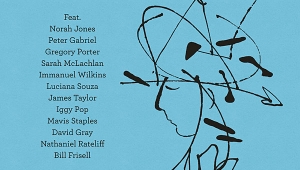| Columns Retired Columns & Blogs |
Recording of May 1998: In the World...
OLU DARA: In the World, from Natchez to New York
Atlantic 83077-2 (CD). 1998. Yves Beauvais, Olu Dara, prods.; Danny Kopelson, eng. Tom Schick, asst. eng. AAD? TT: 47:03
Performance ****
Sonics ****(But see final paragraph.)
Statements like that make me want to run. The problem with most multicultural musical experiments is that, no matter how fruitful such collisions may sound on paper, you eventually have to put the CD in the drawer, press Play, and then listen as your expectations run headlong into reality: the kind of dream described in that press release rarely comes true. Because musicians are, like the rest of us, rooted in one or (at most) two cultures, most of these intriguing, ambitious projects end up as disasters that disgrace not only the artist(s) involved, but the traditions they've borrowed from. Except for Ry Cooder and a very few others, I reached my multicultural red line a long time ago.
Atlantic 83077-2 (CD). 1998. Yves Beauvais, Olu Dara, prods.; Danny Kopelson, eng. Tom Schick, asst. eng. AAD? TT: 47:03
Performance ****
Sonics ****(But see final paragraph.)
"New Orleans jazz runs headlong into Mississippi Delta blues as Olu relates any number of autobiographical tales over a gumbo of Caribbean and African rhythms."—From the press release for Olu Dara's In the World
 | |
Imagine, then, my surprise when I listened to New York avant-garde cornetist Olu Dara's first solo disc. But given his proven credentials, I had hopes that Dara wouldn't fall flat. After a stint in the Navy that took him to Africa, where he was exposed to highlife and other forms of African popular music, this native of Natchez, Mississippi arrived in New York City in 1963 to spend his musically formative years in a late-'60s edition of Art Blakey's Jazz Messengers, after which, in the '70s, he moved into New York's loft-jazz scene. A quick perusal of my collection shows that Dara has played on a number of favorite jazz records, including David Murray's Ming (1980, Black Saint 120045), Cassandra Wilson's Blue Light 'Til Dawn (1993, Blue Note CDP 7 81357 2), and Henry Threadgill's Just the Facts and Pass the Bucket (1983, About Time, no catalog number).
In the '90s, Dara has focused much of his energy on writing music for the stage, including many productions dealing with the life and/or work of black novelist Zora Lee Hurston. In 1996 he appeared in Kansas City, Robert Altman's bloated and confused "jazz film." Among credits too numerous to list here, Dara has also written an original musical melodrama, From Natchez to New York, which was aired on NPR and performed live at the Smithsonian.
Dara has used all of these experiences to create this surprising disc. Stylistically, most of what's here is his own brand of voice-and-cornet folk music, enlivened in places by an African rhythmic flourish ("Okra") or slowed to a smoky delta blues ("Father Blues"). But always there is a coherent feel and texture that has to be called Dara's own style.
Vocally, Dara is more a talker than a singer; but his lyrics have obviously been written to work with this conversational style, and rarely require him to cut loose and warble. In those lyrics (not to mention a photo of a sumptuous feast in the booklet), Dara is sincerely obsessed with food. The opener, ("Okra") uses a vendor's cry to list "blackberries, strawberries, tomatoes, green peanuts," and "pee-cans, pek-cans"—not to mention the southern vegetable of the title. In another African-influenced number three tracks later, "Your Lips," Dara calls his loved one his "Louisiana Plum," then proceeds to chant in the chorus, "Your lips / your lips / your lips...are juice-saaayyyy."
Dara's skill with the (sadly) increasingly obscure cornet comes out in the slow pop of "Harlem Country Girl" and the sinuous, funky "Young Mama." My personal fave here is "Bubber (If Only)," his tribute to cornetist Bubber Miley, the originator of Duke Ellington's growling "jungle" sound, and on which Dara replicates Miley's unmistakable use of mutes. Dara also plays guitar on several cuts, and his son, rapper Nas, guests on "Jungle Jay," on which a B-3 organ is added for atmosphere.
Not a big record of loud or ostentatious charms, In the World: From Natchez to New York is a rich roux of Dara's experiences and sensibilities that happily and convincingly lives up to its multicultural billing.
Like an increasing number of releases, In the World is HDCD-encoded. While the CD played without problem on non-HDCD players, all three samples of the disc that John Atkinson, Wes Phillips, and I tried contained a mastering error that caused all of the HDCD-equipped players to produce annoying 6dB jumps in level as their HDCD decoders randomly switched between modes. Atlantic tells us that the CD will be remastered, so we have to add a caveat to our recommendation: If you have an HDCD player or processor, make sure you buy a copy of the remastered disc.—Robert Baird
- Log in or register to post comments




































